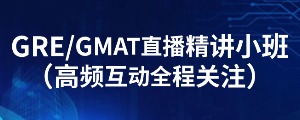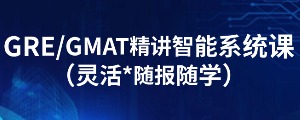选课中心
7099人选课
GMAT公开讲座
0元
GRE公开讲座
0元
一对一体验课
99元
GMAT模考网站
10000人
GRE模考网站
GMAT课程
GRE课程
托福辅导课程
【定制】1v1
私人订制
资料下载
考前冲刺

扫码添加助教
免费领取
备考资料大礼包

扫码关注公众号
新东方在线GMAT频道为大家带来GMAT阅读文章练习四十二,希望对大家GMAT备考有所帮助。更多精彩尽请关注新东方在线GMAT频道!
Excess inventory, a massive problem for many businesses, has several causes, some of which are unavoidable.Overstocks may accumulate through production overruns or errors. Certain styles and colors prove unpopular. With(5)some products—computers and software, toys, and books—last year’s models are difficult to move even at huge discounts. Occasionally the competition introduces a better product. But in many cases the public’s buying tastes simply change, leaving a manufacturer or distributor with(10 ) thousands (or millions) of items that the fickle public no longer wants.
One common way to dispose of this merchandise is to sell it to a liquidator, who buys as cheaply as possible and then resells the merchandise through catalogs, discount(15) stores, and other outlets. However, liquidators may pay less for the merchandise than it cost to make it. Another way to dispose of excess inventory is to dump it. The corporation takes a straight cost write-off on its taxes and hauls the merchandise to a landfill. Although it is hard to believe,(20) there is a sort of convoluted logic to this approach. It is perfectly legal, requires little time or preparation on the company’s part, and solves the problem quickly. The drawback is the remote possibility of getting caught by the news media. Dumping perfectly useful products can turn into a(25) public relations nightmare. Children living in poverty are freezing and XYZ Company has just sent 500 new snowsuits to the local dump. Parents of young children are barely getting by and QPS Company dumps 1,000 cases of disposable diapers because they have slight imperfections.(30)
The managers of these companies are not deliberately wasteful; they are simply unaware of all their alternatives. In 1976 the Internal Revenue Service provided a tangible incentive for businesses to contribute their products to charity. The new tax law allowed corporations to deduct the(35)cost of the product donated plus half the difference between cost and fair market selling price,with the proviso that deductions cannot exceed twice cost. Thus, the federal government sanctions—indeed, encourages—an above-cost federal tax deduction for companies that donate inventory to charity.
1. The author mentions each of the following as a cause of excess inventory EXCEPT
(A) production of too much merchandise
(B) inaccurate forecasting of buyers’ preferences
(C) unrealistic pricing policies
(D) products’ rapid obsolescence
(E) availability of a better product
2. The passage suggests that which of the following is a kind of product that a liquidator who sells to discount stores would be unlikely to wish to acquire?
(A) Furniture
(B) Computers
(C) Kitchen equipment
(D) Baby-care products
(E) Children’s clothing
3. The passage provides information that supports which of the following statements?
(A) Excess inventory results most often from insufficient market analysis by the manufacturer.
(B) Products with slight manufacturing defects may contribute to excess inventory.
(C) Few manufacturers have taken advantage of the changes in the federal tax laws.
(D) Manufacturers who dump their excess inventory are often caught and exposed by the news media.
(E) Most products available in discount stores have come from manufacturers’ excess-inventory stock.
4. The author cites the examples in lines 25-29 mostprobably in order to illustrate
(A) the fiscal irresponsibility of dumping as a policy for dealing with excess inventory
(B) the waste-management problems that dumping new products creates
(C) the advantages to the manufacturer of dumping as a policy
(D) alternatives to dumping explored by different companies
(E) how the news media could portray dumping to the detriment of the manufacturer’s reputation
5. By asserting that manufacturers “are simply unaware” (line 31), the author suggests which of the following?
(A) Manufacturers might donate excess inventory to charity rather than dump it if they knew about the provision in the federal tax code.
(B) The federal government has failed to provide sufficient encouragement to manufacturers to make use of advantageous tax policies.
(C) Manufacturers who choose to dump excess inventory are not aware of the possible effects on their reputation of media coverage of such dumping.
(D) The manufacturers of products disposed of by dumping are unaware of the needs of those people who would find the products useful.
(E) The manufacturers who dump their excess inventory are not familiar with the employment of liquidators to dispose of overstock.
6. The information in the passage suggests that which of the following, if true, would make donating excess inv entory to charity less attractive to manufacturers than dumping?
(A) The costs of getting the inventory to the charitable destination are greater than the above-cost tax deduction.
(B) The news media give manufacturers’ charitable contributions the same amount of coverage that they give dumping.
(C) No straight-cost tax benefit can be claimed for items that are dumped.
(D) The fair-market value of an item in excess inventory is 1.5 times its cost.
(E) Items end up as excess inventory because of a change in the public’s preferences.
7. Information in the passage suggests that one reason manufacturers might take advantage of the tax provision mentioned in the last paragraph is that
(A) there are many kinds of products that cannot be legally dumped in a landfill
(B) liquidators often refuse to handle products with slight imperfections
(C) the law allows a deduction in excess of the cost of manufacturing the product
(D) media coverage of contributions of excess-inventory products to charity is widespread and favorable
(E) no tax deduction is available for products dumped or sold to a liquidator
以上就为大家整理的“GMAT阅读文章练习四十二”,更多精彩内容,请关注新东方在线GMAT频道。
| GMAT直播VIP小班 | GMAT直播精讲班 | GMAT录播课 |
| (VIP小班/全科班+1对1) | (全科精讲/单项备考) | (全科班/单项班) |
| 72.5课时 ¥18800 | 61课时 ¥7796 | 134课时 ¥14680 |

 资料下载
资料下载
新东方GMAT佛脚词汇1.0版本
发布时间:2023-06-30添加新东方美研助教号
回复【资料】获取
新东方GMAT数学500题资料下载
发布时间:2023-05-26添加新东方美研助教号
回复【资料】获取
新东方GMAT800题资料下载
发布时间:2022-05-21添加新东方美研助教号
回复【资料】获取
1000句GMAT真实句子改错问题
发布时间:2022-04-17添加新东方美研助教号
回复【资料】获取
2024杨鹏阅读难句(GMAT+GRE)教程
发布时间:2022-04-17添加新东方美研助教号
回复【资料】获取
新东方GMAT数学500题(解析及答案)
发布时间:2019-11-27添加新东方美研助教号
回复【资料】获取
新东方GMAT800题(逻辑+语法+阅读)
发布时间:2019-11-27添加新东方美研助教号
回复【资料】获取
新东方GMAT佛脚词汇1.0版本
发布时间:2019-11-27添加新东方美研助教号
回复【资料】获取
GMAT词汇/长难句/语法资料大全
发布时间:2019-11-27添加新东方美研助教号
回复【资料】获取
GMAT语文考试圣经(Bible)电子版
发布时间:2019-11-27关注新东方在线美研订阅号
回复【GMAT】获取
GMAT推理圣经PDF电子版
发布时间:2019-11-27添加新东方美研助教号
回复【资料】获取
GMAT考试OG五个版本题号对照表
发布时间:2019-11-27添加新东方美研助教号
回复【资料】获取
GMAT Ultimate Grammar电子书籍PDF
发布时间:2019-11-27添加新东方美研助教号
回复【资料】获取

添加美研助教号,
回复【GMAT】获取备考必看资料包

 推荐阅读
推荐阅读
新东方在线GMAT频道为大家带来GMAT阅读复习的五大步骤,希望对大家GMAT备考有所帮助。更多精彩尽请关注新东方在线GMAT频道! 1:原来
新东方在线GMAT频道为大家带来GMAT阅读背景的培养,希望对大家GMAT备考有所帮助。更多精彩尽请关注新东方在线GMAT频道! 一、经济学
新东方在线GMAT频道为大家带来GMAT阅读复习效率不高怎么办,希望对大家GMAT备考有所帮助。更多精彩尽请关注新东方在线GMAT频道! 建
新东方在线GMAT频道为大家带来GMAT阅读提高速度的根本方法,希望对大家GMAT备考有所帮助。更多精彩尽请关注新东方在线GMAT频道! 1
新东方在线GMAT频道为大家带来GMAT阅读如何避免错误,希望对大家GMAT备考有所帮助。更多精彩尽请关注新东方在线GMAT频道! 要避免GMA
新东方在线GMAT频道为大家带来GMAT阅读技巧的提升,希望对大家GMAT备考有所帮助。更多精彩尽请关注新东方在线GMAT频道! GMAT阅读推
新东方在线GMAT频道为大家带来GMAT阅读备考的注意事项,希望对大家GMAT备考有所帮助。更多精彩尽请关注新东方在线GMAT频道! GMAT阅
新东方在线GMAT频道为大家带来GMAT阅读怎么提高自己的能力,希望对大家GMAT备考有所帮助。更多精彩尽请关注新东方在线GMAT频道! 建
新东方在线GMAT频道为大家带来GMAT阅读长句子的备考,希望对大家GMAT备考有所帮助。更多精彩尽请关注新东方在线GMAT频道! 1 首先
新东方在线GMAT频道为大家带来GMAT阅读水平怎么提高,希望对大家GMAT备考有所帮助。更多精彩尽请关注新东方在线GMAT频道! 下面就来


 GRE/GMAT直播精讲小班
GRE/GMAT直播精讲小班
 GRE/GMAT精讲智能系统课
GRE/GMAT精讲智能系统课
 托福直播/精讲课(30天/60天)
托福直播/精讲课(30天/60天)
 资料下载
资料下载
添加新东方美研助教号
回复【资料】获取
添加新东方美研助教号
回复【资料】获取
添加新东方美研助教号
回复【资料】获取
添加新东方美研助教号
回复【资料】获取
添加新东方美研助教号
回复【资料】获取
添加新东方美研助教号
回复【资料】获取
添加新东方美研助教号
回复【资料】获取
添加新东方美研助教号
回复【资料】获取
添加新东方美研助教号
回复【资料】获取
关注新东方在线美研订阅号
回复【GMAT】获取
添加新东方美研助教号
回复【资料】获取
添加新东方美研助教号
回复【资料】获取
添加新东方美研助教号
回复【资料】获取

 阅读排行榜
阅读排行榜
 相关内容
相关内容